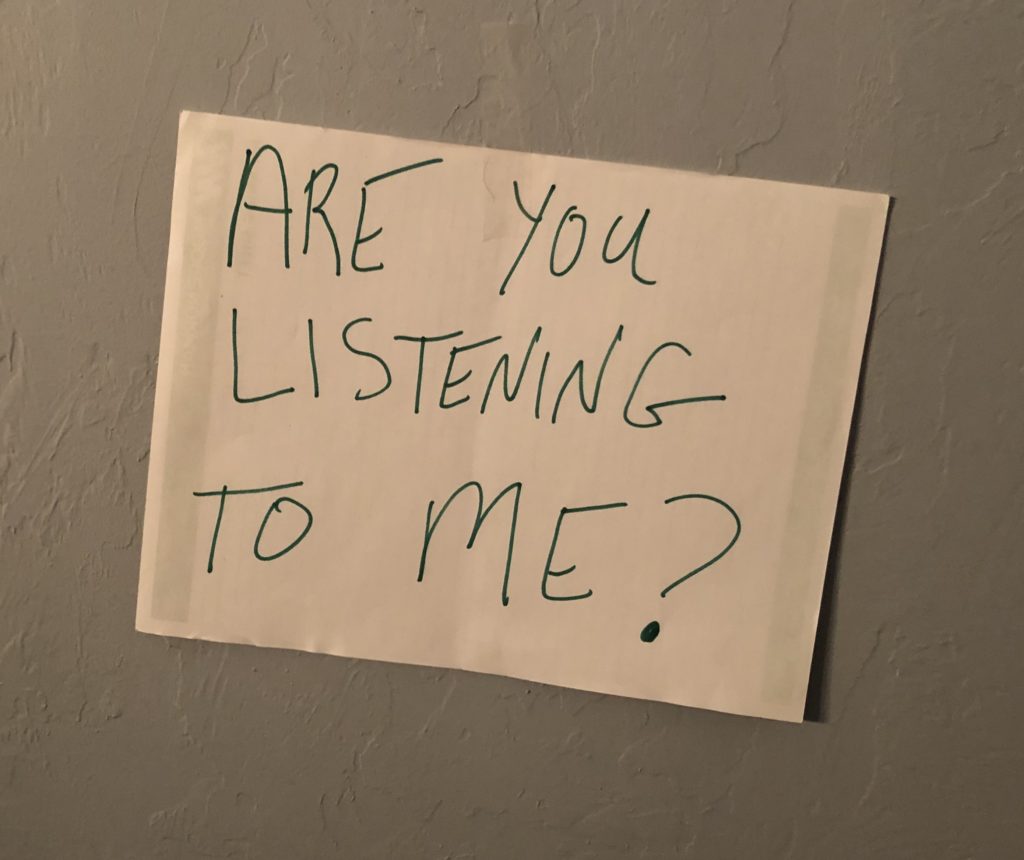
In my daughter’s business there are a lot of haters. She’s a journalist. A young college journalist, not yet graduated into the greater world of news reporting outside the walls of her university, but still a journalist.
I told her to put her armor on. This is going to be a tough road.
She has already encountered blue ribbon haters. On one occasion, she inadvertently addressed a source in an email as he, but it was in fact a she. She ripped into my young college student who had no malicious intent whatsoever. She just made an error, and a minor one at that, based on the source’s name. My daughter apologized of course. But that didn’t matter to the offended. No forgiveness was granted. And not only that but the opportunity for a grown professional adult, (more than ten years older) to teach my student something about her life and her work in a life giving way, was completely lost.
Dang it!
The offended one only had it in her heart to hate, not to teach, not to grow, not to share. This person, who I believe felt like she had to fight hard to gain respect in a man’s world, lashed out at an unsuspecting young reporter, when she felt that position was threatened. She presupposed that this young woman somehow must have known that she was a she, yet intentionally referred to her as he, with the sole purpose of personally offending her. The student in this case had no malice aforethought at all. Indeed, she is by all accounts a studious and sincere student and employee. Not perfect by any measure. Case in point, an error was made. But rather, full of integrity and the desire to report truthfully. It seems crazy to me that you would just assume a complete stranger has it in for you. Yet, people take up this position frequently. They do it all in the name of some grand cause. But the truth is, these days, hate meters are pegged by the slightest provocation.
Let’s be clear. There are extremely serious offenses that happen in our culture, our communities and our world every day that leave deep scars and make the necessary art of forgiveness a challenging one. And rightly so. But more and more, the bar for hating in our culture has dropped dangerously low. The slightest mistake, rendering nothing more than perhaps a typographical error or a poorly timed statement, is elevated to a level of scrutiny for which it is simply not worthy. The truth is that a much more troublesome quandary idles deep inside of the hater. Whatever trivial event they trumpet on the outside as reprehensible, is a reflection of something much more spurious and bitter on the inside.
If you are in the running for a first place trophy in the contest of hating someone, whose only “real” offense is that they are not perfect, you might need to adjust the lenses through which you view all of humanity. Maybe the real issue (the spurious and bitter one) is that this person looks different from you, acts differently or votes differently. It is for all of us to examine difficult situations we find ourselves in, personal and professional and pursue a way to make positive changes, correct mistakes, and in the process grow yourselves and others. However, when we knowingly exploit a person’s mistake or his life and work inexperience in order to tear him down and even destroy him, then in that moment, you are a blue ribbon hater.
Do you see yourself or your child anywhere in this scenario? Are you a blue ribbon hater? One day I was perusing my old neighborhood’s online help site. It’s a place where you can post things for sale or ask questions like where to get a good car mechanic. As you can imagine, it can be very helpful. However, on this particular day a discussion started about an incident at the local high school. The person who initiated the discussion was unhappy with how the school administration handled ensuing communication with parents. By the end of this thread, over 50 grown adults were slinging mud at one another, using words as missiles. There was not a single constructive element to this online conversation. The whole intent of the majority of contributors was to verbally annihilate their perceived foe. These parents were themselves bonafide, blue ribbon haters. Naturally, our kids learn by “monkey see, monkey do.” How sad that truth can be when we, the parents, are acting like a spoiled, selfish, angry 2 year old.
Blue ribbon haters are on the radio too. One of my favorite radio stations does a “birthday scam” every few days. At the bequest of a person’s loved one, the DJ calls that person, and pretends to be a representative from an actual organization or place, who is complaining about their yard being unkempt or the fact they owe money for a cable bill. You get the picture. Almost every single phone call ends with the birthday girl or guy blowing up in anger. Conflict resolution be damned. Threats, swearing, you name it, full scale nastiness ensues. Finally, the DJ says, “Hey this is so and so from such and such radio station, and your husband wanted us to call you and say happy birthday.” By the end of the birthday scam, the only way to describe the birthday girl or boy in that moment is a “blue ribbon hater.”
Blue ribbon haters are characterized by a number of fundamental traits: 1 They have very few conflict resolution skills. If something goes amok with their grades, or their bills, office policy, or their project they hired out, or with their neighbor, or with a co worker, or their aunt, uncle, spouse or child, they go 0 to 60 in a hot minute. Erratic are the emotions of the day. Their responses are shallow, reactive, and angry as opposed to steady, thoughtful, and discerning. They simply don’t have conflict resolution skills that involve the ability to listen before responding, gathering information before acting, and only then advocating for themselves or their organization with both veracity and professionalism. 2 Blue ribbon haters never seek reconciliation, only punishment and self satisfaction. This is self explanatory. The punishment may only be a verbal assault as in the example of the birthday boy on the phone being scammed by the radio DJ. But whatever the case, punishment and a sense of self satisfaction is the goal. 3 Blue ribbon haters are not interested in mentoring relationships. Mentoring threatens to dismantle their platform of discontent. In their minds if they either reconciled with or mentored the person who offended them, that would condone the offense. Mentoring would require mature and well thought out responses. Hating only requires a knee jerk reaction. It’s less work. 4 The goal of the hater is to tear down. It isn’t to build up. To deconstruct, not instruct. The hater asks, “How can I make you feel worse?” And then they do that thing. 5 Blue ribbon haters are primarily interested in advancing their own agendas. Compassion and generosity are always secondary to that. Therefore advancing the cause of personal or professional growth is often viewed as an obstacle. 6 Blue ribbon haters are typically disgruntled in one or more areas of their life. If that is the underpinning of your relationships and your daily demeanor, then the stage on which your life plays out and unfolds will always be marked by conflict and discontent, never resolution and growth.
The title of this article is how NOT to raise blue ribbon haters. Okay. Go back to the last paragraph. And be sure to teach your children the opposite of numbers 1-6. And if you are a Jesus follower, be certain that these tenets didn’t begin with us. Teach them: 1 Conflict resolution skills. (Matthew 18:15-17 & James 1:19-20 & Proverbs 18:13) 2 The necessity of both reconciliation and accountability in order to create positive change. (2 Corinthians 5:12-21) 3 Ongoing mentoring relationships. They say an ounce of prevention is worth a pound of cure. I think it is also true that an ounce of mentoring is worth a pound of healing. (Proverbs 15:22-23 & Proverbs 27:17 & 2 Timothy 2:2) 4 To build up others whenever and wherever we possibly can especially when we are in a position of influence and control. (1 Thessalonians 5:11 & Romans 14:19) 5 Compassion and generosity are not just for the weak-minded as you might have been told. They are in fact indicative of strength and self-confidence. Teach your children the truth about these two tenets. (Ephesians 4:29-32) 6 Discontent that stems from a disgruntled heart, can paralyze you in life and keep you from all good things. Truly, discontent with real issues can lead to real action and change. But, discontent that is rooted in bitterness is a breeding ground for hate. (Philippians 4:10-13)
Don’t. Be. A. Blue. Ribbon. Hater. And don’t teach your kids this either. Assess the situation that is tempting you to proceed with hatefulness. What are the facts involved? Was it personal and malicious? Sadly, personal and malicious, even if they are present, are also not excuses for being a hater. Hate just perpetuates hate. But it helps to make an assessment of the situation to determine with truthfulness how serious it really is or isn’t. Because clearly this is going to inform the level of response required (if it even requires a response). Does the situation you are in, whether you are the offended or the offender, require a response? Does it require change? If it does, then grab ahold of the opportunity to construct not deconstruct, to heal not destroy. To offer solutions, not additional chaos and conflict.
